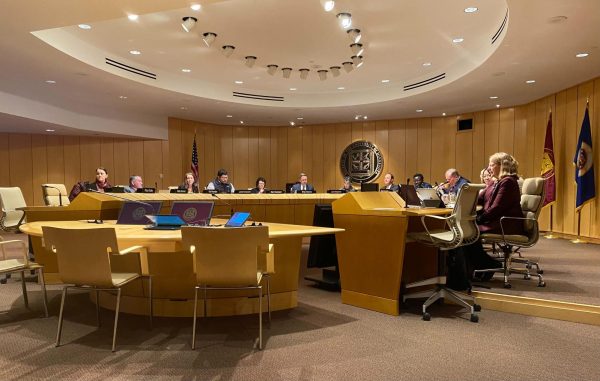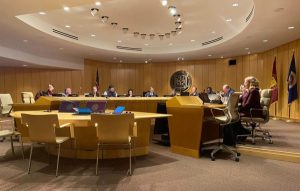JOHANNESBURG, South Africa (The Los Angeles Times) – Like a college student at a frat party, much of the world is on a binge.
Oil and gas are being consumed faster than ever. Emissions of pollutants and global-warming gases are at an all-time high. Forests are shrinking. Market fish are being pulled FROM the sea faster than they can repopulate. And 11,000 species, including one in four mammals, are threatened with extinction.
Although President Bush is a very notable no-show, more than 100 presidents and prime ministers and even a sprinkling of kings will join a cast of thousands at a U.N. summit opening here Monday on how to sustain the Earth. The last time the world’s leaders gathered like this was in Rio de Janeiro, Brazil, in 1992. At that meeting, trumpeted boldly around the globe as the Earth Summit, delegates signed pledges to slow, if not stop, the degradation of the planet.
They didn’t. Most indicators SHOW its health getting worse. So leaders have been arriving here a bit warily, but also determined to SHOW tangible progress.
“By and large, the picture is bleak,” Nitin Desai, secretary-general of what is being called the World Summit on Sustainable Development, said in an interview. “So the main point of this summit is action, not on all fronts, but in critical areas where we need a quantum change.”
This time, summit leaders will push a strategy they hope will lead to quicker action. Instead of waiting for all nations to sign a treaty before setting to work, U.N. officials are nudging clusters of governments, businesses and citizens groups to forge partnerships to get moving on a specific problem or in one region – and hoping the momentum builds.
Many of these partnerships, it is anticipated, will focus on helping the nearly 3 billion people who live in poverty gain access to clean water, proper sanitation and energy – much of it FROM renewable sources such as solar and wind or FROM alternative fuels derived FROM sugar cane or corn.
The idea is simple: Help Third World nations develop in such a way that they can leapfrog over past mistakes in the United States and elsewhere that resulted in polluting the air, the water and the land in the name of convenience and economic progress.
Other partnerships are expected to tackle pollution in the developed world that is contributing to global warming and posing other threats to the environment, to endangered species and to human health. Such global issue networks may focus on everything FROM halting overfishing to reducing reliance on fossil fuels to phasing out cancer-causing chemicals.
“We are trying to change the way people act,” Desai said Sunday, briefing an auditorium packed with journalists FROM around the world.
He and other leaders acknowledged that won’t be easy. But they said that the 104 heads of state and other national leaders have committed to the summit, creating a “critical mass” of world leadership to get things done.
“Even though President Bush won’t be here, the conference will be just as successful,” said Nkosazana Dlamini-Zuma, South Africa’s foreign minister.
Bush announced last week that he would not attend the summit and was dispatching Secretary of State Colin L. Powell to lead the U.S. delegation, but only during the final days of the nearly two-week gathering. Environmental Protection Agency Administrator Christie Todd Whitman will join the delegation with other administration officials.
To soften criticism of its go-it-alone policy on the summit, the Bush administration does plan to announce an additional $4.5 billion in programs to assist developing nations deal with shortages of water, energy and food, and to preserve forests in the Congo Basin.
Meeting with foreign journalists last week, Paula Dobriansky, the State Department’s undersecretary for global affairs, downplayed the environmental focus of the Johannesburg summit. She characterized it as more of an economic forum, a continuation of the administration’s efforts at a trade gathering in Doha, Qatar, last fall and a development summit in March in Monterrey, Mexico. In Monterrey, the United States promised $5 billion to developing countries that adopt sound economic policies and attack corruption.
Doubtless, there will be plenty of Bush-bashing at the summit. It has already begun. The president’s decision to skip the meeting caused a pileup of domestic conservation groups and Democratic politicians to denounce his “snub” of fellow world figures and his forfeiture of leadership.
In addition, a number of leaders and activists FROM impoverished nations have complained bitterly about the farm bill Bush signed INTO law that will extend $180 billion in agriculture subsidies _ after the United States has instructed poor countries to cut subsidies to their own farmers. Such U.S. subsidies drive down prices and make it all but impossible for unsubsidized farmers to compete.
Criticism also is expected FROM European delegates, who are frustrated at the lack of leadership FROM the world’s biggest polluter when it comes to greenhouse gases.
While European countries reduced carbon dioxide emissions by about 2 percent between 1990 and 2000, greenhouse-gas emissions surged by 18 percent in the United States, according to statistics compiled by the United Nations and others. The statistics SHOW that the United States is now responsible for 24 percent of such emissions worldwide.















